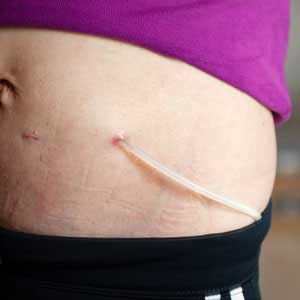Peritoneal dialysis in Anantapur
Peritoneal Dialysis Treatment in Anantapur is a form of dialysis that utilizes the peritoneum, a membrane located in the abdominal cavity, to facilitate the exchange of fluids and dissolved substances with the bloodstream. This method is employed to eliminate surplus fluid, rectify electrolyte imbalances, and remove toxins in individuals suffering from kidney failure.
Benefits of Peritoneal Dialysis
Dialysis is a medical procedure designed to assist individuals suffering from end-stage renal disease in enhancing both the duration and quality of their lives by Best Kidney Dialysis Doctor in Anantapur, Dr. M. Surendra Babu. It is important that the patients are aware of the different benefits of a dialysis before opting for it from your health care provider. The advantages of peritoneal dialysis in comparison to hemodialysis are as follows

- Increased autonomy and flexibility in daily activities - Peritoneal dialysis can often be performed at home, at work, or in any clean and dry environment. This flexibility is particularly beneficial for individuals who have employment commitments, travel frequently, or reside at a considerable distance from a hemodialysis facility.
- A less restrictive dietary regimen - Peritoneal dialysis operates in a more continuous manner than hemodialysis, resulting in reduced accumulation of potassium, sodium, and fluids in the body. Consequently, this allows for a more adaptable diet compared to what is typically permitted during hemodialysis.
- Prolonged preservation of kidney function - In cases of kidney failure, the kidneys may lose most of their functional capacity, yet they can retain some residual function for a period. Individuals undergoing peritoneal dialysis may maintain this residual kidney function for a longer duration than those receiving hemodialysis.
- Absence of venous needles - Prior to initiating peritoneal dialysis, a catheter is surgically inserted into the abdominal cavity. This catheter facilitates the entry and exit of cleansing dialysis fluid during treatment. In contrast, hemodialysis requires the insertion of needles into a vein at the beginning of each session to allow for the external purification of blood.
Peritoneal dialysis is a medical procedure designed to eliminate waste materials and surplus fluids from the bloodstream when the kidneys are no longer functioning effectively by Best Nephrology doctor in Anantapur. Peritoneal dialysis can be administered in various settings, including at home, in the workplace, or during travel. However, it is not suitable for all individuals experiencing kidney failure. Unlike hemodialysis, which is a more prevalent method that cleanses the blood using an external machine, peritoneal dialysis operates internally within the body at Kidney dialysis hospital in Anantapur. This treatment requires individuals to possess manual dexterity and the ability to manage their care independently at home, or alternatively, to have a reliable caregiver to assist them throughout the process.
